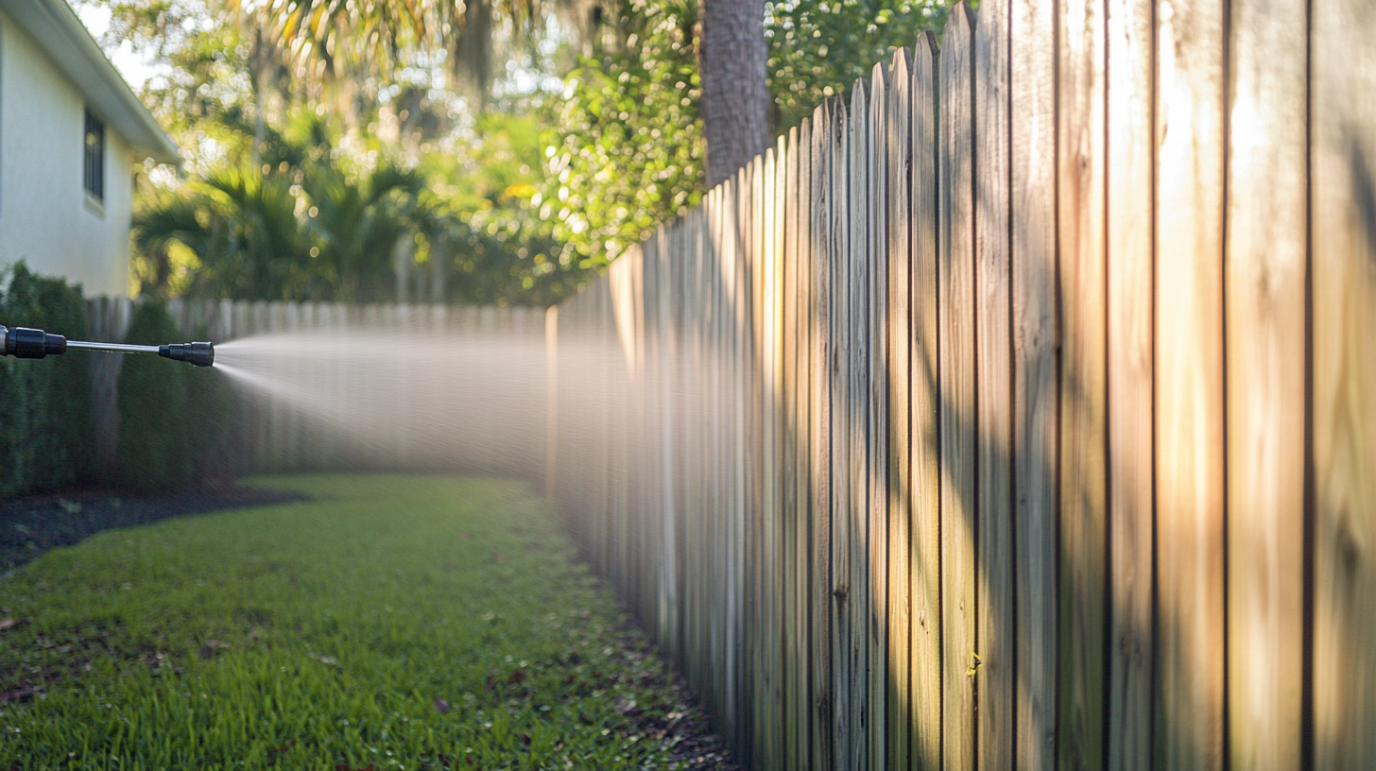
Homeowners in St. Petersburg know how quickly fences can accumulate dirt, algae, and salt buildup. Choosing between soft washing vs. pressure washing is essential for maintaining fences in Florida’s hot and salty environment. But which method is best for your fence?
In this guide, we’ll compare soft washing and pressure washing for different fence materials, highlighting the pros and cons of each. Understanding the right approach will help protect your fence. At the same time, it keeps looking clean and well-maintained.
Understanding Soft Washing vs. Pressure Washing
Both soft washing and pressure washing are effective fence cleaning methods, but they work in very different ways. The right choice depends on your fence material and the level of dirt or organic buildup.
- Soft Washing: This method uses low-pressure water and specialized cleaning solutions to break down mold, mildew, and algae. It’s ideal for delicate surfaces like wood fences and painted vinyl.
- Pressure Washing: This technique relies on high-pressure water to blast away dirt and grime. It’s best for sturdy materials like metal and concrete fences but can damage softer surfaces if misused.
Since Florida fences are constantly exposed to moisture and salt air, choosing the safest cleaning method will extend the life of your fence. In the next section, we’ll explore how each method works for different fencing materials.
Best Cleaning Method for Different Fence Materials
Not all fences are built the same, and using the wrong cleaning method can cause unnecessary damage. Here’s a breakdown of soft washing vs. pressure washing based on different fencing materials:
Wood Fences (Soft Washing Recommended)
Florida’s humidity creates the perfect environment for mold, algae, and mildew to grow on wood fences. High-pressure washing can strip away paint, stain, or even splinter the wood. Instead, soft washing gently removes buildup without harming the wood’s surface.
Vinyl Fences (Soft Washing Preferred)
Vinyl fences are durable, but pressure washing can cause cracks or force water into seams, leading to long-term damage. Soft washing removes dirt and mildew without compromising the fence’s structure, making it the safest option.
Metal Fences (Pressure Washing Works Best)
Aluminum and wrought iron fences can handle pressure washing effectively. They remove rust, salt buildup, and dirt. Yet, softer metal fences with paint or coatings may benefit from a lower pressure setting or soft washing to avoid chipping.
Florida fences face extreme weather conditions. So, using the proper method ensures your fence stays clean without unnecessary damage. Next, we’ll look at the benefits and drawbacks of each cleaning technique.

Pros and Cons of Soft Washing vs. Pressure Washing
Both soft washing and pressure washing have their advantages and drawbacks. Knowing when to use each method can help homeowners in St. Petersburg keep their fences clean without causing damage.
Soft Washing: The Gentle Approach
Pros:
- Safe for delicate materials like wood and vinyl
- Uses biodegradable cleaning solutions to kill mold, mildew, and algae at the root
- Prevents damage caused by high-pressure water
Cons:
- Takes longer to see results as the cleaning solutions need time to work
- Requires special detergents and proper application techniques
Pressure Washing: The High-Power Solution
Pros:
- Instantly removes tough grime, salt buildup, and dirt
- Ideal for metal fences and other sturdy surfaces
- No need for extra cleaning chemicals in many cases
Cons:
- Can strip paint, crack vinyl, or splinter wood
- High pressure can force water into fence seams, leading to moisture damage
- Less effective at killing mold and mildew, meaning buildup may return faster
Florida fences can use both soft washing and pressure washing. Soft washing is best for routine maintenance. Meanwhile, pressure washing removes tough stains on stronger materials. In the next section, we’ll explain why regular fence washing is essential in Florida’s climate.
Why Florida Fences Need Regular Washing
Living in St. Petersburg and the surrounding coastal areas means dealing with Florida’s intense heat, humidity, and salty air—all of which can take a toll on your fence. Without regular cleaning, fences can become discolored, weakened, or even structurally damaged. Here’s why routine fence washing is essential in Florida:
- Prevents Mold, Mildew, and Algae Growth: Florida’s high humidity creates the perfect environment for mold and algae to thrive, especially on wood and vinyl fences. This buildup can cause staining, unpleasant odors, and even deterioration if left untreated. Soft washing is the best way to remove these organic materials without damaging the fence.
- Protects Against Salt and Coastal Air Damage: Salty air can lead to corrosion for homes near the coast in areas like Treasure Island. Regular pressure washing helps remove salt deposits that could weaken the material over time.
- Enhances Curb Appeal and Property Value: A dirty, stained fence can make even a well-maintained yard look unkempt. Routine cleaning ensures your fence stays in top condition.

Keep Your Florida Fence Clean with Professional Washing
Choosing the right cleaning method protects your fence from Florida’s heat, humidity, and salty air. Soft washing is best for delicate surfaces. Pressure washing works well for tough stains on durable materials.
Trust All Around Tampa Paver Services for expert fence washing in St. Petersburg and surrounding areas. Ready to refresh your fence? Fill out our online form or call (727) 291-9436 to schedule your professional fence cleaning!
